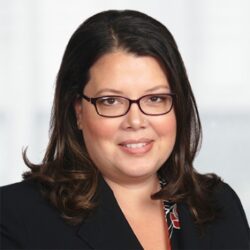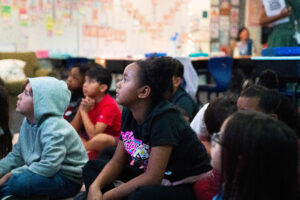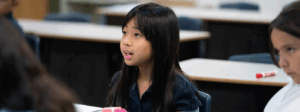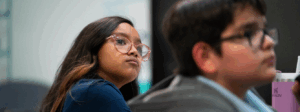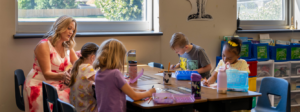Michelle Mercado, our Vice President of the Southwest Region, was recently invited to give the closing address at Evolución, hosted by the Latinx Education Collaborative. This post, focused on the importance of fellowship in building strong Latinx communities, is excerpted from her remarks. You can watch the full address here.
My grandparents came from Nuevo Leon, Mexico. From Linares, donde se hacen los dulces, glorias. When my grandfather was a kid, he left Mexico in search of something he likely couldn’t name—opportunity. He enrolled himself in school in Texas and over time found himself in Chicago where he helped to build the railroads. Eventually, he joined the army and served in WWII as a pathway to citizenship. When he married my grandmother, he brought her to Chicago, along with many of his brothers and sisters and settled in to make a life for his family in the US.
It’s amazing, these stories we have, of how our padres, abuelos, ancestors, immigrated, for a better life. It sounds so simple. But we know, it wasn’t. There are so many stories, struggles, triumphs and tears held in that statement of immigration. Its powerful. And I love the lesson of community and fellowship that comes from my grandfather’s journey. He came to the US and then he brought so many family members up after him. He felt that responsibility. In fact, at his funeral, his brothers and sisters, all told their kids, “your tío Olegario, you owe him everything. You wouldn’t be here if your tío hadn’t brought us here, to America.” Hay poder en trabajando juntos. Es increíble.
Chicago, that is where my father and his brother and sisters were born. And their story will be a familiar one. A story of linguistic injustice. The Spanish that was spoken at home and in the community was seen as a weakness at school. The American dream to them was assimilation of both culture and language. In fact, in Catholic school, students were physically punished for speaking Spanish. So the language was lost to my father. While he understood Spanish out of necessity given my abuelita didn’t really speak English, he did not learn to speak it himself. English was seen as the goal, not the opportunity and benefit of bilingualism.
Because of that, Spanish was not spoken in my house when I was growing up. And at school and in my day to day life in the Chicago suburbs, we were the “Mer-CAH-dos.” We assimilated into white America and found success and community absent of our culture. But we spent holidays and family events in Chicago with mis tíos and primos. That felt like a different world. Arroz y frijoles, carnitas, menudo. Escuchábamos música y bailábamos. And it was beautiful but yet somehow foreign to me. I wasn’t completely comfortable here or there. Ni de aquí ni de allá. But there is power in that identity of being from both places. And beauty in our ability to switch between cultures and communities and our ability to find a connection in both.
Today, I have a much stronger sense of who I am. And central to the development of my identity has been the opportunity to have fellowship, to be in spaces where I could be my authentic self.
In my first year with TNTP, I attended a Staff of Color gathering at TNTP’s annual conference. It was a tiny group of people filling a handful of tables in a small hotel conference room. I had never been in a space like that before. It was a space organized by people of color, for people of color with the explicit intention of creating community and support for each other. I remember the facilitator passionately declaring that he and other leaders were there to support each of us and that we would find our space and place at TNTP. He said that if we could simply articulate what we wanted and needed, they would make sure we had it. I remember a feeling of home in a way that seemed so natural and yet so foreign. It was natural in how comfortable and easy the conversation and community felt. But foreign in that I had never found a professional space that invited such explicit conversation about identity and difference.
That is the power of spaces like this. We must have spaces where we embrace our commonalities and culture. These spaces allow us the opportunity to gain confidence in being our authentic selves that we can then carry back into our white-dominant workplaces. These are our safe spaces to return to where we find el poder en trabajar juntos.
I recently led a strategy meeting where we gathered a group of multilingual learning experts, mostly recent hires to TNTP, mostly bilingual and Latinx. And to begin our work together, we shared our stories of language and identity to understand how our own stories shape our motivation and reasons for being in this work. Hearing the stories of my colleagues, the trauma of language and school, was profound. And the conversation of the meeting flowed seamlessly in and out of Spanish. It was beautiful. A year ago, I could not have imagined a space at TNTP like that. It felt like the beginnings of the realization of the future I imagined when I stepped into the leadership of the Southwest at TNTP.
While I’m proud of the work I’ve done to get to where I am professionally and in my own understanding of who I am, I have a lot to learn and far to go. We must remind ourselves that those of us who are in a position to do so, need to continue to lift up those around us. I wouldn’t be here today if it were not for Latinas like Layla Avila. So I make lifting up others a conscious daily practice. And as an extreme introvert, that can be hard and exhausting. But it’s important. I work to ensure I know the names and stories of all the Latinx staff who live and work in the Southwest at TNTP. I work to ensure that I know what their stories and goals are. I reach out and listen and learn together with my Latinx colleagues. I try to set up an open door policy where they can reach out to me for support or help. We are family for each other which means we have drama, we fight and argue. But in the end, we come together in support of our fight to end educational injustice.
Again, spaces like that are so important for creating a world that is better for us, our families, our students and their families. They build us up, give us confidence to thrive in an education space that is overwhelmingly white and middle class. Together, let’s build spaces where students are proud to speak all of their languages, proud to share who they are with authenticity. Let’s create schools and communities where my father would have been proud to speak Spanish and I would have proudly introduced myself from a young age as Michelle Mercado.

